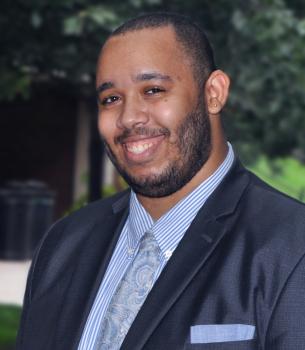For Dr. Varlack, Diversifying One’s Own Perspective Is Crucial to Learning

By Timothy Stasek ’21
Many may tend to think of learning as a process specifically for students, but Dr. Christopher Allen Varlack, assistant professor of English, emphasizes how much professors can grow and adapt as well through this process. In fact, a guiding principle for him and for his students is, “If I’m not diversifying my own perspective, I’m not globalizing my mind.”
Dr. Varlack, who joined the University in August 2020, emphasizes how important it is for everyone involved in the learning process to be open and receptive to new ideas. While the traditional literary canon, classic authors, and more well-established journals and literary criticism typically receive a lot of focus in academia, Dr. Varlack wants students to feel comfortable engaging under-examined and non-academic sources as well. He claims that digital platforms like Twitter and TikTok contain some serious dialogue and points to those and other platforms as reasons why embracing digital humanities—which focuses on what the study of humanities looks like in the 21st century while welcoming that digital space and all of the tools and platforms that go along with it—is so important.
“If we can close that divide between academia and those who are engaging in the digital space, we can better serve the function that education is intended to serve in our society, and that’s evoking necessary conversations,” said Dr. Varlack.
Dr. Varlack hopes to expand the African-American literature program at Arcadia, thus far teaching courses on African-American short fiction, the Harlem Renaissance, and Slave Narratives. He also teaches as part of the University’s undergraduate Creative Writing program, currently instructing a creative non-fiction workshop course.
Having moved from Baltimore, Md., to Hatboro, Pa., last year, Dr. Varlack had to navigate a new place and a new job during an unusual time, due to the shift in the learning experience brought on by COVID-19. Even though Dr. Varlack notes that many would probably view this as a “treacherous unknown,” he understands why so many faculty members see the University as a home. In this short time, he has already felt embraced by students, faculty, and staff alike.
Prior to joining Arcadia, he taught at Morgan State University and University of Maryland, Baltimore County (UMBC). The latter provided him the opportunity to help students design specific degrees that had not otherwise been offered by combining aspects of different disciplines, which encouraged him to think innovatively about how one can apply these skills and courses apart from their predetermined tracks. There, he also designed courses on African-American socio-political thought and the fluidity of racial and gender identities.
While such conversations and dialogue are being promulgated in classrooms, it is crucial to keep in mind the relevance of those discussions. Dr. Varlack feels too often some scholars “interpret literature for the sake of interpreting literature.” He claims to be guilty of that himself at times, and he sees his opportunity at Arcadia as a way to move toward a more substantial dialogue and learning process, particularly around issues of social justice. He encourages his students to do the same and to participate in difficult discussions that will enhance and even challenge their understanding of present realities, affirming that “it wouldn’t be doing justice to the subject matter if we didn’t use these texts as a lens to understand what’s going on in the world today.”

